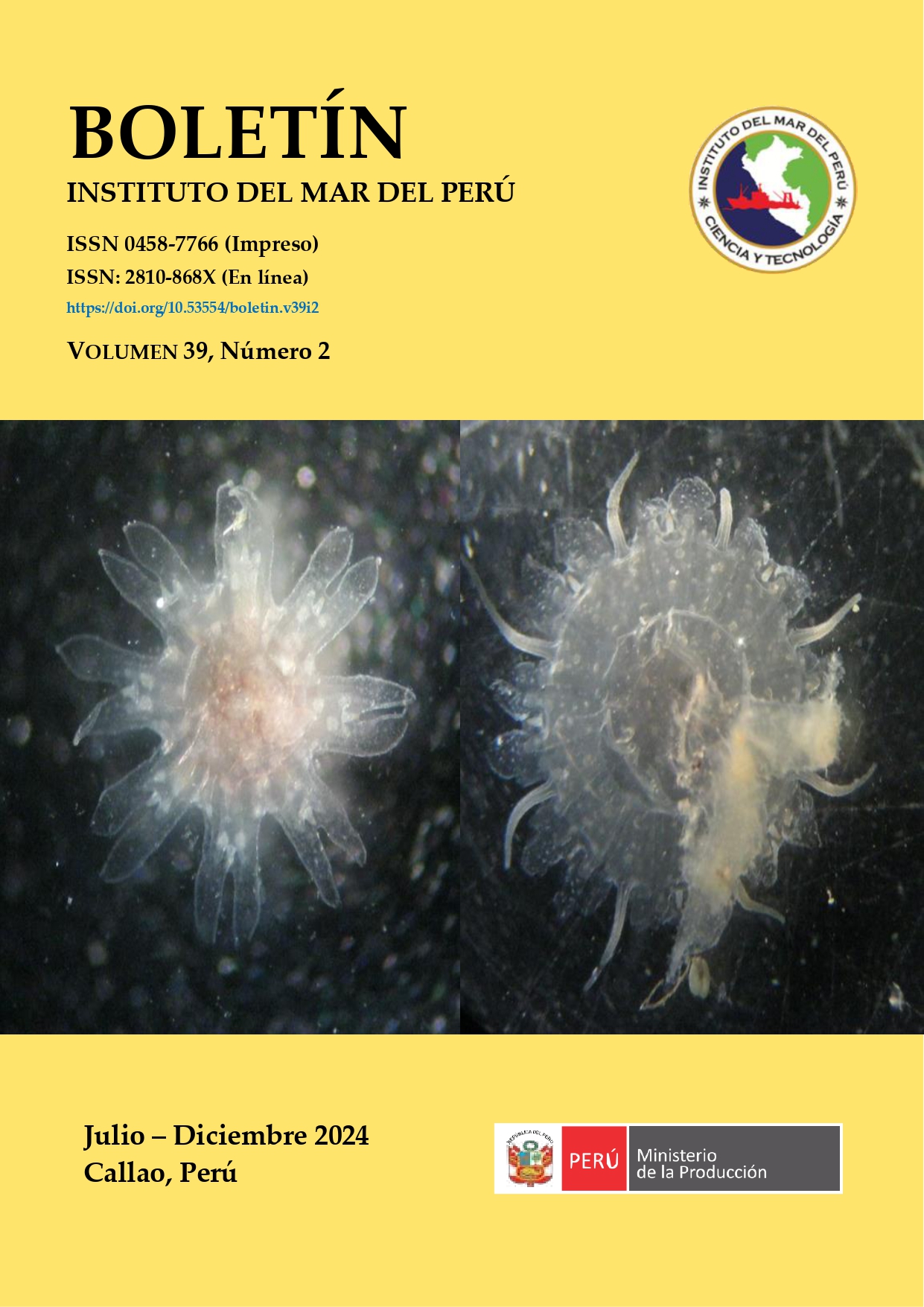Registro de Gloiopotes huttoni (Thomson, 1890) (Siphonostomatoida: Copepoda), parásito del merlín rayado Kajikia audax (Philippi, 1887) capturado frente al Callao, Perú
DOI:
https://doi.org/10.53554/boletin.v39i2.420Palabras clave:
Parásito, Caligidae, Gloiopotes huttoni, merlín rayado, Kajikia audax, PerúResumen
Se identificó al copépodo parásito Gloiopotes huttoni colectado de un merlín rayado Kajikia audax, el cual fue capturado de manera incidental por la flota pesquera industrial de anchoveta a 51 millas náuticas del puerto del Callao (12°11’941"S -77°58’387"W) en noviembre 2023. El merlín rayado midió 182 cm de longitud (ojo-furca) y se registraron algunas variables de su entorno como temperatura superficial del mar y profundidad de captura. La colecta del parásito en estudio se realizó sobre la superficie ventral de la piel, entre la primera y segunda aleta anal. Se contabilizaron 53 ejemplares del copépodo G. huttoni, de los cuales 32 fueron hembras (10,73 – 12,97 mm de longitud total [LT]) y 21 fueron machos (10,14 – 11,58 mm LT) presentaron tonalidad púrpura en su estado fresco y coloración crema en su estado de conservación. Los caracteres taxonómicos que definió a G. huttoni fueron la forma del segmento genital (más largo que ancho) y la ubicación del quinto pereiópodo (no se extiende hasta el final del abdomen). Esta especie parasita a peces pelágicos de gran tamaño, teniendo especificidad por los peces picudos de los océanos Índico y Pacífico. La presente nota científica representa el segundo registro (luego de 56 años) del copépodo G. huttoni como ectoparásito de K. audax para el litoral peruano, capturado frente al puerto del Callao.
Descargas
Alternative Metrics
Métricas
Citas
Abitia-Cárdenas, L. A., Galvan-Magaña, F. & Rodríguez-Romero, J. (1997). Food habits and energy values of prey of striped marlin Tetrapturus audax off coast of Mexico. Fishery Bulletin, 95(2), 360-368. https://spo.nmfs.noaa.gov/node/14422
Anislado-Tolentino, V., Del Moral-Flores, L. F., WakidaKusunoki, A. T., & del S. Andrade-González, Z. (2021). Presence of Conchoderma auritum and C. virgatum (Maxillopoda, Lepadidae) and Gloiopotes huttoni (Copepoda, Caligidae) on the black marlin, from the Gulf of Tehuantepec, Mexico. Crustaceana, 94(11-12), 1327-1334. https://doi.org/10.1163/15685403-bja10168
Chirichigno, N. & Cornejo, R. (2001). Catálogo comentado de los peces marinos del Perú (Publicación especial). Instituto del Mar del Perú.
Cressey, R. F. (1967). Genus Gloiopotes and a new species with notes on host specificity and instraspecific variation (Copepoda: Caligoida). Proceedings of the United States National Museum, 122(3600), 1-22. https://doi.org/10.5479/si.00963801.122-3600.1
Dojiri, M. & Ho, J-S. (2013). Systematics of the Caligidae, copepods parasitic on marine fishes (Serie Crustaceana Monograph, Vol. 18). Brill. https://doi.org/10.1163/9789004204256
Hewitt, G. C. (1964). A redescription of Gloiopotes huttoni (Thomson, 1889), with a key to the species of the genus. Transactions of the Royal Society of New Zealand, Zoology, 5(8), 85-96.
Kabata, Z. (1992). Copepods parasitic on fishes: keys and notes for identifications of the species (Synopses of the British fauna, N°. 47). Universal Book Services.
Karthick Rajan, D., Ravichandran, S. & Venmath Maran, B. A. (2018). First record of the Gloiopotes huttoni (Thomson, 1890) (Copepoda: Caligidae) parasitic on the swordfish Xiphias gladius along the southeast coast of India. Journal of Parasitic Diseases, 42, 458-461. https://doi.org/10.1007/s12639-018-1013-z
Musaliyarakam, N., Varghese, S. P., Shivadas Shirke, S. & Das, P. (2018). New records of four parasitic copepods (Crustacea, Siphonomastoida) from Andaman and Nicobar Waters, India. Journal of Fisheries and Environment, 42(2), 1-11. https://li01.tci-thaijo.org/index.php/JFE/article/view/105119
Nagasawa, K. & Shimose, T. (2020). Gloiopotes huttoni (Copepoda: Caligidae) parasitic on black marlin, Istiompax indica, from southern Japan, with a review of the hosts and distribution of G. huttoni. Crustacean Research, 49, 23-32. https://doi.org/10.18353/crustacea.49.0_23
Nakamura, I. (1974). Some aspects of the systematics and distribution of Billfishes. In R. S. Shomura & F. Williams (Eds.), Proceedings of the International Billfish Symposium, Kailua-Kona, Hawaii, 9–12 August 1972. Part 1. Report of the Symposium (NOAA Technical Report NMFS SSRF-675, pp. 45-53). National Marine Fisheries Service (NMFS). https://repository.library.noaa.gov/view/noaa/9044
Pellón, J. & Cárdenas, G. (2014). Pesca de atunes y captura incidental por buques de palangre en aguas peruanas y áreas adyacentes. Inf Inst Mar Perú, 41(1-4), 215-216. https://hdl.handle.net/20.500.12958/2321
Pradeep, H. D., Venu, S. & Sumitha, G. (2019). First record of Gloiopotes watsoni Kirtisinghe, 1834 parasitic on Istiophorus platypteurs (Shaw and Nodder, 1792) from Andaman Sea with DNA barcodes. I3 Biodiversity, 5, 502.
Shiino, S. M. (1963). Parasitic copepods of the Eastern Pacific fishes. 1. Records of the known species. Report of the Faculty of Fisheries Prefectural University of Mie, 4, 335-347.
Venmathi, B. A., Soh, H. Y., Hwang, U. W., Chang, C. Y. & Myoung, J-G. (2015). First records of parasitic copepods (Crustacea, Siphonostomatoida) from marine fishes in Korea. Tropical Biomedicine, 32(2), 352-364. https://pubmed.ncbi.nlm.nih.gov/26691264
Descargas
Publicado
Cómo citar
Número
Sección
Licencia
Derechos de autor 2024 Boletin Instituto del Mar del Perú

Esta obra está bajo una licencia internacional Creative Commons Atribución-NoComercial-CompartirIgual 4.0.
© Bol Inst Mar Perú. La revista retiene los derechos patrimoniales de los autores con la finalidad de garantizar el acceso abierto de los manuscritos.
Todos los manuscritos publicados en la revista se distribuyen bajo la licencia “Creative Commons Atribución - NoComercial - CompartirIgual 4.0 Internacional” (CC BY-NC-SA 4.0). Implica que autores y lectores pueden de forma gratuita descargar, almacenar, copiar, redistribuir, remezclar, transformar o generar obras derivadas a partir del manuscrito, siempre y cuando mencionen la fuente primaria de publicación y la autoría del manuscrito, así como que se realice sin fines comerciales y se distribuya bajo la misma licencia que el original. Puede consultar desde aquí la versión informativa y el texto legal de la licencia.









